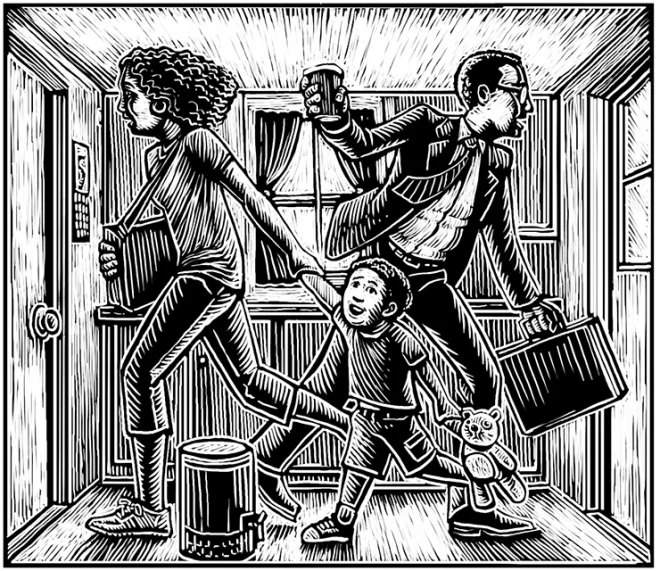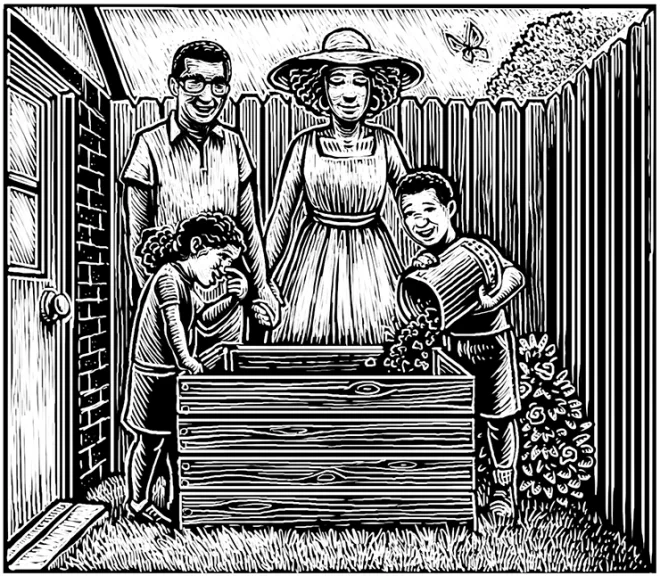Back when my oldest, Zach, now 11, was just a toddler, I decided I wanted to compost. At the time, we were living in Naperville, Illinois. Every weekend Zach and I went to the farmer’s market in nearby Wheaton for our fruits and vegetables (and a few amazing baked goods), and I cooked as much unprocessed foods as possible because I was going through IVF treatments and wanted a clean diet. I would gaze at our rental home’s sunny backyard and imagine a future as a woman who made her own bread, composted her trash, and grew her own vegetables in a sundress and a big floppy hat, all while teaching her children about the important role the earthworm plays.
With delusions of becoming this Mother Earth woman, I researched different com-posting strategies and settled on Bokashi composting, a Japanese method that relies on fermentation. Unlike traditional com-posting, Bokashi requires the purchase of an ashen material that triggers the fermentation process which accelerates composting, and these “ashes” are sprinkled on top of the food waste each time new material is added to the bin. Based on my limited research, it seemed easier and less messy than traditional forms of composting. When I entered my credit card information and hit “Purchase” for the Bokashi system, I was excited for this future world where I was holistic, nurturing, and part of the circle of life.

By the time the materials arrived a few days later, I was consumed by the swirl of work, daycare pick-ups and drop-offs, and daily IVF shots just below my belly button. I put the materials in the front closet for when life slowed enough to learn the nuances of a new venture.
A few weeks later our family moved to Minnesota. As I unpacked boxes in the kitchen, I came across the composting supplies. I pulled the composting materials out of the box. The directions were straightforward and simple enough, but figuring out a system for collecting kitchen scraps and maintaining the bins outside during a Minnesota Winter felt daunting. I placed the supplies in the spare bedroom.
A year later I found myself cleaning out the spare bedroom, selling some of the items stored there on Craigslist and donating others, to make room for a new white crib, a fresh coat of subtle pink paint, and a large tree decal full of small cartoonish birds. When I came across the composting materials, I couldn’t bring myself to part with them. I still desired to be the type of person who composted. Someone who helped foster the process of decay and rebirth. Someone who grew some of the food her family ate. Someone who was better than me.
I moved the supplies down to the storage space in the basement where we kept Christmas decorations. I told myself that when life settled and the kids were a bit more self-sufficient, I would carve out the time and utilize the composting materials.
Shortly after I delivered a beautiful baby girl. I returned to work. The kids grew older, and our weekends and evenings were overrun with activities. I trained for Ironmans and marathons. I was promoted in my career. My husband’s work responsibilities increased. One day bled into the next—the speed and scheduling were all-consuming. Every year on the Sunday after Thanksgiving, when I pulled out the Christmas decorations, I moved aside the composting supplies, barely registering that I was relocating the reminder of a version of me that had once seemed possible.
When my youngest was four, we moved again. Again, the composting materials somehow survived the moving purge and made the trip to our new house. I was busier at work than I had ever been, routinely traveling around the world. My husband’s business ventures continued to thrive. The kids were swept up in a whirlwind of school, friends, hockey, baseball, math tutoring, soccer, and Cub Scouts. I was constantly trying to keep my nose above water in the flood of homework to finish, carpooling to do, dinner to fix, conferences to attend, documents to review, school fundraisers to volunteer at. There were so many things to do! I couldn’t see that life was happening, and I was without the bandwidth to enjoy it.
Even this past Christmas, after having quit my job so I could spend more time with my family and explore my passion for writing, I merely stepped over the composting bins when I put away the holiday decorations. The life they represented was forgotten.
This February, news of a coronavirus in China, and then in Italy, began to circulate. Even as the disease crept in, I still believed we would be traveling in March for Spring break to Australia and New Zealand with my in-laws, a trip we’d been planning for over a year. I still worried about my son’s baseball tryouts and ensuring my little girl was on a softball team with her friends. I thought there’d be more trips to Florida to help with my grandparents. I was excited to attend a writing retreat in May. My son looked forward to graduating from elementary school.
Then in one weekend we went from celebrating the end of my daughter’s hockey season with the families of her entire team all shoved next to each other at small tables to canceling her birthday party just two days later to adhere to social distancing guidelines. Life jarred to a halt. At first, I believed only the following two weeks would be lost. But then I, and the rest of the world, continued to sit idly targeting deadlines a month out. Ultimately, we sat openmouthed as the stillness loomed indefinitely.
There was nowhere to go. No appointments to keep. No practices. We ate together as a family each evening no matter what time dinner went on the table. The busyness subsided. At first the brightness of living constantly in the present was glaring. I could feel time passing, and this awareness was uncomfortable.
I decided to plant a garden. I ordered seeds and followed their packets’ instructions. Each day I watched my pepper, cucumber, squash, and tomato seeds germinate in the mini-greenhouse I kept on the kitchen counter. Tiny shoots breached the confines of the seeds and reached towards the sun, doing what seeds have done for millions of years, reminding me that these unprecedented times are but a blip to the natural world.
That’s when I remembered my composting supplies. There was no reason not to pull them out. Even if my efforts failed, the worst-case scenario would be a smelly mess—and these days I’d have the time to clean it up. I studied the directions. I constructed the bins (the fermentation process produces liquid so the bins need to be drained occasionally from the bottom). I placed a small metal canister on our counter to collect food scraps. It was all embarrassingly easy. There was no reason I should not have started composting years ago.
Later that evening, I made vegetable soup, placing the excess onion and the carrot tops in the canister on top of the counter. Since then, the kids have found great joy in scraping their plates after dinner into the canister. Those annoying crumbs in the bottom of the cereal box that no one eats could be poured into the compost canister without guilt. The bottoms of the tulips I cut off every couple of days trying to extend their truncated lives in the vase also went into the canister.
The canister typically fills in only a few days. I then carry it outside, take the lid off of one of two airtight bins, and dump our food scraps in. I won’t lie, a rather offensive smell is released from the containers. My kids love helping with this process. They scream dramatically when the lid comes off, “Oh, that’s horrible! My nose burns.”
Once they’ve sprinted off to a safe distance, they dramatically creep back towards the open bin, take another breath, and say, “OK, it’s bad, but I guess it’s not deadly.”
I then sprinkle a layer of Bokashi on top. I’m not certain of the science, but Bokashi is full of microbes that accelerate the fermentation process. Once the bin is completely full—and smells its absolute worst—I leave the airtight container undisturbed for two weeks (periodically draining the fermented liquid, which is supposed to be abundant in amino acids and vitamins and good for plants). The kids like to assist in this process, placing their noses over the pink liquid and noting, “It smells sorta like kombucha.”
During these times we have long family dinners where no one is in a rush to clear the plates. We tell jokes. We report on the highs and lows of our days. We speculate about what we would do first if we woke up the next morning to discover we were giants. We clean up the kitchen collectively. Some nights we watch the ESPN documentary on Michael Jordan or the National Geographic documentary on Jane Goodall. Other nights we introduce our kids to “Tommy Boy” or “Ferris Bueller’s Day Off.” We all go to bed at the same time. My son comments on how he likes the slower pace of life and claims that next year he won’t play baseball so he’ll have more free time (he makes it very clear he’ll still play hockey). The economy is in the crapper, and people are incredibly sick, and I’ve lost a grandfather during this time whose death I cannot mourn, and my husband has lost a grandmother to Covid. So we are not without our bruises. But our immediate little world, our small family unit, is thriving. We have long conversations. We sit in silence. We laugh. Sometimes we grow incredibly frustrated with one another. We are fermenting beautifully in our little bin.

Eventually it’s time to dump the compost bin into a small hole we’ve dug next to the outer perimeter of our backyard and let nature complete the composting process. I look at what I can only call a pile of sludge and marvel at its transformation. The earthworms will peacefully invade and perform their restorative recycling act. They will have the space to twist, turn, eat, stretch, grind, grow, and digest. Their work and a bit of patience will create a gift to be appreciated and utilized.
Looking at the composted material and imagining its potential, I wonder if my family is forging something as equally powerful. Will we, too, evolve into something rich and fertile when we’re exposed to the elements of the world? ❖


 Previous
Previous

